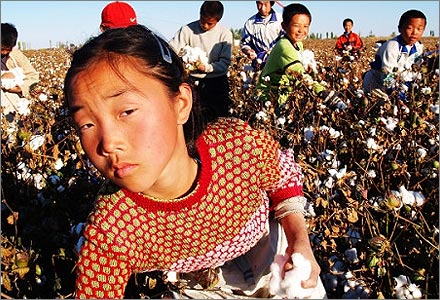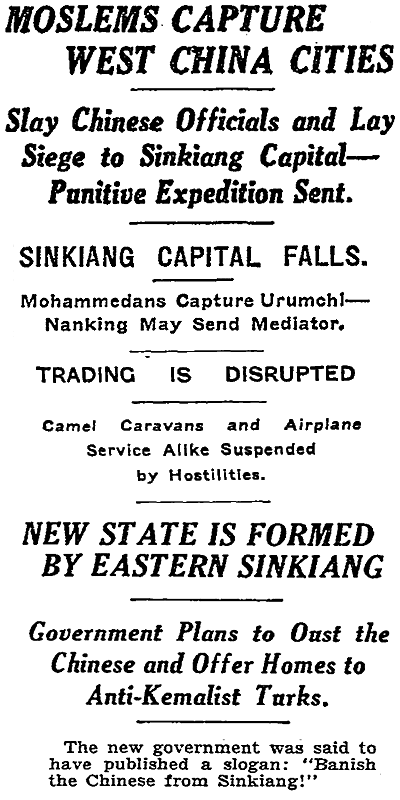« October 2007 | HOME PAGE | December 2007 »
November 30, 2007
Marco? Polo!
Did Marco Polo really make it to China and see all of the places he wrote about in The Book of Wonders?
It's a question that will probably never be answered to anyone's complete satisfaction. As an optimist, I like to believe that Marco made it to Xanadu but somehow never came across rice, tea, or chopsticks. National Geographic photographer Mike Yamashita revisited the famed traveler's supposed destinations within China to shoot a documentary, "Marco Polo: The China Mystery Revealed". I've excerpted 23 minutes of footage dealing only with Marco Polo's travels in Xinjiang, but those of you wanting to watch the whole program can download it here (probably illegally) using a BitTorrent client.
Part 1: Karakul & Kashgar
Part 2: Yengisar & Hotan
Part 3: Into the Taklamakan Desert
The squeamish among you should be warned that the third clip has some rather graphic footage of a sheep being slaughtered for a feast. (Mmmm, kebabs.) If you're interested in watching other Xinjiang-related videos that have been featured on this site in the past, just click here to visit my YouTube channel.
posted November 30, 2007 at 10:54 AM unofficial Xinjiang time | Comments (38)
November 26, 2007
Teaching English in Xinjiang
 As the proprietor of this humble blog, I'm often asked questions about teaching opportunities in Xinjiang. I also hear a lot of complaints from people already working here. I'm hoping that the title I've chosen for this entry will help to enlighten those of you out there Googling for ESL jobs in Xinjiang. (You should probably also check out Dave's ESL Cafe for up-to-date listings.) I'm happy to answer your questions via email, but I'd like any of you with teaching experience in the region to use the comments section below not only to recommend good programs but also to share warnings about bad schools/experiences.
As the proprietor of this humble blog, I'm often asked questions about teaching opportunities in Xinjiang. I also hear a lot of complaints from people already working here. I'm hoping that the title I've chosen for this entry will help to enlighten those of you out there Googling for ESL jobs in Xinjiang. (You should probably also check out Dave's ESL Cafe for up-to-date listings.) I'm happy to answer your questions via email, but I'd like any of you with teaching experience in the region to use the comments section below not only to recommend good programs but also to share warnings about bad schools/experiences.
I've seen a number of teachers come and go over the past three years and I'd say about two-thirds of them have ended up unhappy in some significant way with their jobs and the treatment they receive, although to be fair the same could probably be said for any Chinese city. It's usually the people running the programs who cause the most chafing. A few of us have managed to fall in love with Xinjiang anyway, and it's my hope that with a little guidance you'll manage to have one of the most memorable experiences of your life.
Just a bit of disclosure: I'm thinking of getting into the teacher racket myself — most likely offering positions starting in September 2008 in Korla where I live — so I may use your comments below to preemptively solve potential problems that my teachers may encounter. No harm there, right?
posted November 26, 2007 at 03:49 AM unofficial Xinjiang time | Comments (95)
November 21, 2007
Cotton Pickin' Child Labor?

There was a minor hubbub late last week over photos published on Moobol showing young students picking cotton in Xinjiang. There's even been some talk of attempting to trace this cotton to clothing sold in U.S. stores, if such a connection even exists.
The photos come on the heels of a report issued last month by the Congressional Executive Commission on China in which forced cotton picking was discussed under the heading of "Child Labor":
Although the Chinese government has condemned the use of child labor and pledged to take stronger measures to combat it, it continues to actively endorse other forms of child labor under the guise of work-study activities. Under work-study programs implemented in various parts of China, children as young as elementary school students pick crops and engage in other physical labor. In the Xinjiang Uighur Autonomous Region (XUAR), for example, some 800,000 students began their 2006 academic year by picking cotton in school-organized work-study programs, while elementary school students in some parts of the XUAR were forced to pick hops.... Reports from the region indicated that in recent years students had been made to work in 12-hour shifts and suffered injuries from dangerous working conditions and sexual abuse from adult laborers.
Central government legislation allows this form of child labor. National provisions prohibiting child labor provide that "education practice labor" and vocational skills training labor organized by schools and other educational and vocational institutes do not constitute the use of child labor when such activities do not adversely affect the safety and health of the students.... A nationwide regulation on work-study programs for elementary and secondary school students outlines the general terms of such programs, which it says are meant to cultivate morals, contribute to production outputs, and generate resources for improving schools.
Now, I'm no great advocate of exploiting children for labor, but does anyone else out there agree with me that the critics are going a bit far on this issue? At the school I used to teach for in Korla, the older kids spend about two weeks every autumn picking cotton on one of the local collective farms. Sure, the kids gripe and the work is hard, but I see a lot of benefit in giving these children ― who are lucky enough to be growing up in modern China rather than, say, China forty years ago ― a taste of the backbreaking labor that most Chinese engage in on a daily basis. I think it's a great idea to force children to pitch in for the "greater good".
I realize that the system is open to exploitation and abuse, but what system isn't? (Unemployment checks, how I loved thee!) Wouldn't American kids be well served if they were required to spend two weeks working for the Forest Service every year?
And remember, if activists succeed in getting the cotton picking work-study program eliminated, they'll be sentencing these poor children to two more weeks of classes and homework ever year... and that's just plain cruel!
posted November 21, 2007 at 09:19 AM unofficial Xinjiang time | Comments (93)
November 10, 2007
Uyghur Muslims, Uyghur Commies.
The excellent PBS series China from the Inside was first broadcast more than six months ago, but I've just gotten around to posting this Xinjiang-related clip on YouTube:
The shots of the famous bazaar in Kashgar are nice, but what I thought might be more interesting for many of you are the interviews with Uyghur members of the Communist Party of China. Listening to Ismayil Tiliwaldi - who serves as the Chairman of Xinjiang's "autonomous" regional government - explain his conversion from Islam to communism makes an important point that everyone should keep in mind. That is, not all Uyghurs are separatists, nor are they all even Muslims.
Just like anywhere else in the world, sentiments in Xinjiang aren't as black and white as the over-simplified reports in most newspapers and magazines would lead one to believe. In fact, I'm sure that it's about 1,000-times more common for a Uyghur to join the Party and get a cushy government job than it is for one to engage in foolhardy attempts to split the great Chinese motherland!
Think about it. What would you do if you were a Uyghur in Xinjiang? Or, as that old bumper sticker says: WWYDIYWAUIX?
posted November 10, 2007 at 12:23 AM unofficial Xinjiang time | Comments (110)
November 06, 2007
More Tough Times for Missionaries
 Passing through the 'Smelter of the Lord' in the Land of the Free. When you come across a website with a slogan like that, consider it a warning that you're about to enter a mind-warping world of Jesus-related craziness.
Passing through the 'Smelter of the Lord' in the Land of the Free. When you come across a website with a slogan like that, consider it a warning that you're about to enter a mind-warping world of Jesus-related craziness.
The site in question, D-Day for America, has recently published an account of a Public Security Bureau hunt in Xinjiang for a group of foreign missionaries and their Chinese cohorts. Predictably, God ends up intervening on the side of the missionaries. (Doesn't the PSB deserve to catch a break, too?) That the story is told in Bible-scented Chinglish only serves to enhance the feeling one gets that these Watchman folks must be totally f#@!in' crazy!
I'll string together some of the best bits for you below, but you should read the whole report to remind yourself how sane you are, at least compared to some folks out there. By the way, it seems pretty clear to me that the "Joshua" and "Philip" mentioned in this report aren't foreigners, but Chinese collaberateurs.
Before this incident happened, during his fasting prayer, Lord told [Joshua]: "There's persecution coming upon you, but don't worry, I'll help you!" One night, his wife dreamt that there were many snakes and scorpions in the church, they went up to beat them to death, and blood splashed everywhere.
That day during their teaching Joshua went out of the church for a walk, he found a police car, he immediately arranged the church people to take the teachers away...If the police found witness that the foreign team came to their church, Philip and Joshua would be sentenced.
Police asked Joshua "How did you get to know foreigners?" He said "When I went for tour in Shanghai, I saw foreigners, I sang 'Hallelujah Jesus', then the foreigners said 'Jesus? Yes, you believe in Jesus?'"
One time the police was going to beat him... Joshua said he had gone through awful weakness, he really feared to cry... When he was put into the police car, he was frightened, Lord told him "When I was hanged on the cross, nobody was with Me, but now I am with you."
Joshua said they prayed asking the Lord to blind the police's eyes and to disorder their minds... He wouldn't confess us to the police even beat him to death.
Don't worry if you're a bit confused. It takes a couple of readings to understand the narrative. Apparently, this raid went down somewhere in northern Xinjiang. If anyone's got more details, please fill me in.
Best part of the story: the PSB officers catch the portly "Joshua" because they've observed a "fat chap" hanging out with foreigners. I can certainly feel his pain. It's damn hard for us big boys to blend into a crowd here in China!
Hrmm. Am I pushing this missionary persecution thing too far? I've made my opinions clear in the past, but it still feels kind of wrong to be celebrating the misfortune of others. Instead, maybe I should spend the rest of my days spreading kindness and brotherly love to the native savages of Xinjiang.
Woops! Bad idea.
posted November 06, 2007 at 02:44 AM unofficial Xinjiang time | Comments (26)
November 03, 2007
Glory Days for Separatists

The image above is a collection of headlines I pulled from the New York Times archive between March 1933, when news of a Muslim uprising in western China reached New York, and January 1934, when an independent East Turkestan was established with it's capital in Kashgar. Those must have been heady days for the vile splittists and saboteurs who to this very day have not resigned themselves to defeat.
This is also the environment into which a simple British pickle merchant found himself thrust as the self-titled King of Islamistan. I'll publish that story later this week, but you can all bring yourselves up to speed by reading the article below...

The above article was originally published in the New York Times on June 18, 1933. Note that it took a full 26 days (!) for the dispatch to arrive in New York from Xinjiang.
posted November 03, 2007 at 12:08 PM unofficial Xinjiang time | Comments (46)
